…by Jonas E. Alexis

Martin Luther, as we have already seen in the previous article, was a man whose distinctive theological cast on essential issues was unquestionably planted in blatant contradictions. In fact, blatant contradictions have existed in all judaizing movements.
Secular and philo-Semitic historian Will Durant himself declared that when people began judaizing, “the Old Testament overshadowed the New” and the teachings of Christ had to be subservient to Old Testament laws.[1]
Any judaizing movement, by definition, has to absorb many of the nullified laws of the Old Testament. In our own time, Sarah Palin for example frequently invoked passages in the Old Testament to pursue her political ends.[2]
Michelle Bachmann did the same thing in 2011. When she was obviously outmatched and losing support in Iowa, she didn’t invoke Christ or figures in the New Testament, but turned to Old Testament figures.[3]
Let us here from the horse’s mouth:
“I want to call to mind in remembrance a hero of mine. And he’s from ancient Israel. And from history we know, in the recorded annals of time, that this was someone considered more inconsequential, but to me he had an inspiring, powerful story.
“His name was Jonathan. And it was in ancient Israel. His father was king. He was the first king of ancient Israel and his name was King Saul.
“And there was another battle that Israel faced. And that battle was with a group of people called the Philistines. And the Philistines had a position of power. And they were up on a cliff during the time of this battle…
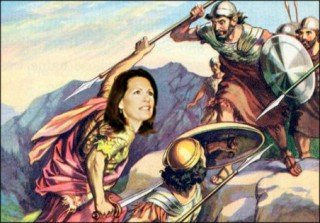
“King Saul looked up on the cliff and he saw that the Philistines far outnumbered the Israelites. And that they were far better equipped and had every possible advantage that they could have against Israel.
“And so the king pulled back. And the king saw that because of the great advantage that the Philistines had, he waited. He was paralyzed with fear. And he saw certain defeat for Israel.
“But not so his son Jonathan. Jonathan made a secret pact with his armor bearer. And Jonathan turned to his armor bearer. And as he enlisted that support, he turned to that armor bearer. ‘Let’s climb to the top of the outpost where the Philistines stand.’
“And so Jonathan turned to his compatriot, the armor bearer, and he said these words: ‘Come then, we will cross over toward the men and let them see us. If they say to us: ‘Wait there until we come to you,’ we will stay and not go up to them. But if they say ‘Come up to us,’ we will climb up, because that will be our sign that the Lord has given them into our hands.’
“So what did the armor bearer reply? The reply of the armor bearer was one of loyalty and trust. And the armor bearer said this: ‘Go ahead, I am with you, heart and soul.’ And so they climbed.
“And Jonathan and the armor bearer not only defeated the Philistines who were at the outpost, Jonathan and the armor bearer defeated the entire Philistine army.
“It’s all because two men had courage. And they scaled the cliffs. And they took the enemy. And they won the day.
“And it’s my opinion that at this moment in American history, the people of this great nation have that courage and they are longing for a president who will listen to them, and who will lead from the front and not from behind, and who will stand with them and take the cliffs of the problems that we have in this country today.”[4]
In short, for Bachmann, the Old Testament was or perhaps still is the key to understanding her political ideology. She continued,
“And I like to think that the women of Issachar too knew what to do. Now, thousands of years later, it is my generation’s turn to do our part to rebuild the foundation, to reestablish the framework, to help repair the walls.
“After all, in the time of the Twelve Tribes and in the present time, we worship the same eternal and unchangeable God. My struggle to change those destructive government policies would ultimately bring me into politics.”[5]
But in order for Bachmann to get into politics, she had to go through the Zionist conversion or reconfirmation, which happened when she went to Israel, and which she later described as
“a moving memorable experience…So while the Israel of the ancient world gave us the living foundation of the Christian faith, the Israel of today is a valued and valuable ally to the United States. And for me, many decades later, it is a privilege to show my support in Congress for a strong and sovereign Israel.”[6]
————————————————–
 Luther’s Reformation, as we shall see here, was not exempt from the judaizing spirit.
Luther’s Reformation, as we shall see here, was not exempt from the judaizing spirit.
At the dawn of his movement, Luther reversed the traditional teachings of the Church on the Jews by misrepresenting it; building on a straw man, he moved on to attack it relentlessly. Speaking against the Church, he wrote in his essay That Jesus Was Born a Jew,
“If I had been a Jew and had seen such dolts and blockheads govern and teach the Christian faith, I would sooner have become a hog than a Christian. They have dealt with the Jews as if they were dogs rather than human beings.
“They have done little else than deride them and seize their property. When they baptize them they show them nothing of Christian doctrine or life, but only subject them to popishness and mockery.
Luther moved on to say that
“If the apostles, who also were Jews, had dealt with us Gentiles as we Gentiles deal with the Jews, there would never have been a Christian among the Gentiles.”[7]
Obviously Dr. Luther did not care to include the Apostle Paul’s statement on the Jews in his analysis.
Paul (a Pharisee of the highest order[8]), who himself was an ethnic Jew persecuting Christians before his conversion,[9] and who on many occasions implicitly declared that he is “an Aramaic-speaking Jew who inherited the language from his parents,”[10] says that the Jews
“killed the Lord Jesus and their own prophets, and have persecuted us. They please not God and are contrary to all men” (1 Thessalonians 2:15).
And Luther, here and elsewhere, did not provide an exegetical study on the New Testament with respect to Christ and the Jewish people. He failed to mention that Christ “came unto his own [meaning the Jews], and his own received him not” (John 1:11).
The Apostle Peter proceeds to say that “let all the house of Israel know assuredly, that God hath made the same Jesus, whom ye have crucified, both Lord and Christ” (Acts 2:36). When the Jews heard this, “they were pricked in their heart” and repented.
Finally, Stephen made things less complicated when he told the Jews, “Men, brethren, and fathers, hearken; The God of glory appeared unto our father Abraham, when he was in Mesopotamia, before he dwelt in Charan” (Acts 7:2).
The Jews, of course, did not listen, and ended up stoning Stephen because he had become a Christian.

Here we must emphasize perhaps for the last time that in the first and second centuries, the issue was not and has never been racial but theological largely because the protagonists and antagonists were all Semites.
Nothing has changed since then. We’ve noted in a previous article that Israel refused to give Shmuel Oswald Rufeisen (known as Brother Daniel) citizenship because he had converted to Christianity.
Born to Jewish parents during the Nazi era, Rufeisen was a full-blown Zionist in his youth and hid in a monastery in the 1930s. His unpardonable sin was that he betrayed Judaism when he ended up studying for the priesthood.
According to Shlomo Sand, this
“overcame the deterministic biological imaginary. It was categorically decided that there was no Jewish nationality without its religious shell. Ethnocentric Zionism needed the Halakhic precepts as its principal criteria, and the secular judges [in Israel] understood this national-historical necessity as well.”[11]
It is the same thing with Johann Andreas Eisenmenger, a Jewish scholar during the late 1600s who converted to Christianity. Eisenmenger was not an undisciplined scholar—he mastered Arabic, Hebrew, and Aramaic. Not only that, he established a strong, friendly relationship with the Talmudic scholars and rabbis of his day, making sure that he did not misrepresent Jewish traditions even though he had been brought up with them.
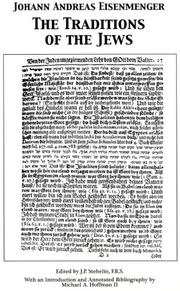 In 1700, after nineteen years of studying the original languages and literature, Eisenmenger published his monumental work, The Tradition of the Jews. But to this day it is called an anti-Semitic work.
In 1700, after nineteen years of studying the original languages and literature, Eisenmenger published his monumental work, The Tradition of the Jews. But to this day it is called an anti-Semitic work.
For historian Heinrich Graetz, one of the fathers of modern Jewish historiography, “Eisenmenger belonged to the class of insects which sucks poison even out of flowers.”[12] As such, Graetz said that The Traditions of the Jews is “a venomous book” that has the potential to create a spirit of anti-Semitism.[13] Instead of refuting Eisenmenger’s points, Graetz resorts to name calling.
When Joseph Pfefferkorn became a Christian in the sixteenth century, Graetz called him “the scum of the Jewish people” and a “noisome insect.”[14]
In the first century, Jewish historian Josephus became a fully assimilated Jew, yet Jewish historian Solomon Grayzel says that Josephus, among others things, “betrayed the cause of Jewish independence at the start.”[15]
When Josephus wrote that Titus did not want to destroy the Temple in AD 70, Grayzel retorted that “Josephus always defended Titus before the Jews, and he was not above telling a falsehood when it suited his purpose.”[16]
All of this proves that the central issue can never be understood in racial terms or in the form of DNA. Biological determinists have already presupposed that Jewish determinism is true in their mind and have relentlessly and irrationally forced that weltanschauung upon their own “science,” not upon something that can be observed objectively and independently.
What if the actual science disproves the claim? That is no problem for biological determinists because ideology overshadows everything else. Biological determinists would still propound the same claim ad nauseam without any substance and with little respect for historical and rational inquiry.
In short, for many, ideology is more powerful than science, epistemological pursuit, and scientific inquiry. Science and reason are their friends if and only if science and reason seem to advance their ideological presupposition. As Daniel J. Flynn rightly put it,
“When ideology is your guide, you’re bound to get lost. Ideology deludes, inspires dishonesty, and breeds fanaticism. Facts, experience, and logic are much better at leading you to truth. Truth, however, is not everyone’s intended destination.
“It is quite pedestrian occurrence for stupid people to fall for stupid ideas. More interesting, and of greater harm to society, is the phenomena of smart people falling for stupid ideas. Ph.D.s, high IQs, and intellectual honors are not antidotes to thick-headedness.
“Ideologues forgo independent judgment in favor of having their views handed to them. To succumb to ideology is to put your brain on autopilot. Ideology preordains your reaction to issues, ideas, and people, your view of politics, philosophy, economics, and history.”[17]
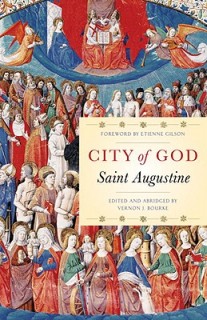 Augustine basically said the same thing in the City of God, which was written in the fifth century, right after Rome was invaded by the barbarians in 410.
Augustine basically said the same thing in the City of God, which was written in the fifth century, right after Rome was invaded by the barbarians in 410.
He wrote that when man “stubbornly resist[s] the plain evidence of logic and truth,” when he consciously or unconsciously pays little attention to rational inference, then “men of sound judgment and adequate powers of exposition would not need to engage in lengthy discussions in order to refute mistakes and fanciful conjectures.” He continues,
“But as things are, the intelligent are infected by a gross mental disorder [another translation says ‘mental infirmity’] which makes them defend the irrational workings of their minds as if they were logic and truth itself, even when the evidence has been put before them as plainly as is humanly possible. Either they are too blind to see what is put before their face, or they are too perversely obstinate to admit what they see.
“And yet, will we ever come to an end of discussion and talk if we think we must always reply to replies? For replies come from those who either cannot understand what is said to them, or are so stubborn and contentious that they refuse to give in even if they do understand….
“You can see how infinitely laborious and fruitless it would be to try to refute every objection they offer, when they have resolved never to think before they speak…”[18]
————————————————–

Luther propounded one straw man after another and moved on to say that Christians should be reminded that “the Jews are of the lineage of Christ.”
Luther knew better. He knew too well that the contention has always revolved around theological terms, and Luther knew that the Church’s position on the Jews has always been that the Jews cannot be Abraham’s seed by rejecting Christ.
If the issue was racial, the Apostle Paul would not have said things like, “And if ye be Christ’s then are ye Abraham’s seed, and heirs according to the promise” (Galatians 2:28).
But by making such a serious and, perhaps deliberate, mistake at the dawn of his Reformation, Luther was bound to get lost in a torrent of his own theological mismatch. Moreover, Luther, whether he liked it or not, was laying the groundwork for other Protestant movements to muddle the Jewish water. Eminent Protestant scholar Donald M. Lewis writes,
“The evangelicals’ sense of Britishness was being redefined with Philo-Semitism and Christian Zionism being added as the new layers of British identity. Britain as ‘Protestant Israel’ was to protect and defend ‘Israel according to the flesh’ from its ancient persecuting enemy, Roman Catholicism.
“This novel emphasis upon evangelical connectedness to ‘God’s ancient people’ was thus an idea whose time had come in that it vindicated evangelical claims to be authentic ‘apostolic Christianity….’
 “By emphasizing their connectedness to the Jews, evangelicals could trump both Roman Catholic and Tractarian historical claims…In this way, both Philo-Semitism and Christian Zionism became key aspects of the identity construction of British evangelicalism by the 1830s.”[19]
“By emphasizing their connectedness to the Jews, evangelicals could trump both Roman Catholic and Tractarian historical claims…In this way, both Philo-Semitism and Christian Zionism became key aspects of the identity construction of British evangelicalism by the 1830s.”[19]
More importantly, the Church, in its entire history, has never even remotely suggested that Jews should be physically attacked or treated as non-humans, as Luther implied. With respect to the Inquisition, I would refer readers to historian Henry Kamen’s The Spanish Inquisition: A Historical Revision.[20]
When mobs were persecuting Jews in major parts of Europe, the Jews went to popes for refuge precisely because they knew that the Church would not fail to protect them. This has been consistently documented by historians of various stripes, including Philo-Semitic historians and Jewish scholars.[21]
Jewish historian Salo Baron, who abides by the thesis that Jews are persecuted for what they are and not for what they do, goes so far as to say that
“Had it not been for the Catholic Church, the Jews would not have survived the Middle Ages in Christian Europe.”[22]
Cambridge Jewish historian Israel Abrahams made it clear in his Jewish Life in the Middle Ages that“Just as the Crusades produced no massacres in Spain or Italy, so it was almost a tradition with the popes of Rome to protect the Jews who were near at hand” and moved on to admit that anti-Jewish attacks, though prevalent in some quarters in Europe during the Middle Ages, “is untrue of Italy.”[23]
 Abrahams continued, “The Italian poets were far kinder to the Jews than were the Germans, and the friendship between Dante and his Jewish imitator Immanuel was typical of this gentler attitude of the Italian muse.”[24]
Abrahams continued, “The Italian poets were far kinder to the Jews than were the Germans, and the friendship between Dante and his Jewish imitator Immanuel was typical of this gentler attitude of the Italian muse.”[24]
Abrahams then dropped this unpopular statement,
“As a whole, heresy was a reversion to Old Testament and even Jewish ideals. It is indubitable that the heretical doctrines of the Southern-French Algigenses in the beginning of the thirteenth century, as of the Hussites in the fifteenth, were largely the result of friendly intercourse between Christians and educated Jews…The indirect effects of the Protestant Reformation were equally deleterious to the Jews.”[25]
Heinrich Graetz, one of the fathers of modern Jewish historiography, basically said the same thing, moving further to argue that
“Whenever a party in Christendom opposes itself to the ruling church, it assumes a tinge of the Old Testament, not to say Jewish spirit.”[26]
In a similar vein, Rabbi Louis Israel Newman argued that all the opposing parties were schooled in the Old Testament primarily by Jewish revolutionaries, rabbis, and Hebraists.[27]
————————————————–
 Since Luther’s Reformation lacked a serious and rigorous theological vision on the Jewish question, it was inevitable that Luther would apply the Old Testament principles in order to punish the Jews.
Since Luther’s Reformation lacked a serious and rigorous theological vision on the Jewish question, it was inevitable that Luther would apply the Old Testament principles in order to punish the Jews.
As soon as Luther discovered that the Jewish question was not as easy as he thought it was, he went on lambasting the Jews like a raving maniac or a mad man. He unequivocally wrote,
“First, to set fire to their synagogues or schools and to bury and cover with dirt whatever will not burn, so that no man will ever again see a stone or cinder of them. This is to be done in honor of our Lord and of Christendom, so that God might see that we are Christians, and do not condone or knowingly tolerate such public lying, cursing, and blaspheming of his Son and of his Christians.
“For whatever we tolerated in the past unknowingly, and I myself was unaware of it, will be pardoned by God.
“But if we, now that we are informed, were to protect and shield such a house for the Jews, existing right before our very nose, in which they lie about, blaspheme, curse, vilify, and defame Christ and us (as was heard above), it would be the same as if we were doing all this and even worse ourselves, as we very well know.
“In Deuteronomy 13:12 Moses writes that any city that is given to idolatry shall be totally destroyed by fire, and nothing of it shall be preserved. If he were alive today, he would be the first to set fire to the synagogues and houses of the Jews…
“Second, I advise that their houses also be razed and destroyed. For they pursue in them the same aims as in their synagogues. Instead they might be lodged under a roof or in a barn, like the gypsies.
“This will bring home to them the fact that they are not masters in our country, as they boast, but that they are living in exile and in captivity, as they incessantly wail and lament about us before God.
“Third, I advise that all their prayer books and Talmudic writings, in which such idolatry, lies, cursing, and blasphemy are taught, be taken from them. Fourth, I advise that their rabbis be forbidden to teach henceforth on pain of loss of life and limb.
“For they have justly forfeited the right to such an office by holding the poor Jews captive with the saying of Moses (Deuteronomy 17:10) in which he commands them to obey their teachers on penalty of death, although Moses clearly adds: ‘what they teach you in accord with the law of the Lord.’

“Those villains ignore that. They wantonly employ the poor people’s obedience contrary to the law of the Lord and infuse them with this poison, cursing, and blasphemy.”
Whatever happened to Luther’s statement that Jews should be treated kindly? Whatever happens to Christ’s teachings? But that is just the icing on the cake. It gets even more interesting. The Jews, Luther said in his disparaging tongue,
“let us work in the sweat of our brow to earn money and property while they sit behind the stove, idle the way the time, fart, and roast pears. They stuff themselves, guzzle, and live in luxury and ease from our hard-earned goods. With their accursed usury they hold us and our property captive.”[28]
Luther, as we will see when we discuss capitalism, was not completely against usury, but here he was complaining that the Jews used usury to usurp the goyim.
Once again, Luther’s theology and analysis on the Jews and the Church were firmly planted in contradiction. A contradiction is, put simply, this: “Nothing be said both to be and not be something at the same time and in the same respect.”[29]
In other words, for two statements to be contradictory, they must say opposite things at the same time, and in the same respect. For example, if a person says Marilyn Manson is a male and another person says Marilyn Manson is a female, then we are confronted with a vital contradiction. A person cannot be a male and a female at the same time and in the same respect.
But if a person says Ted Kaczynski was a skilled terrorist and another person says Ted Kaczynski was an able mathematician, those two statements are not contradictory. A person can be a skilled terrorist and a mathematician at the same time.
If Luther propounds sola scriptura on the one hand and at the same time rejects books of the Scripture on the other, then we have a vital contradiction that cannot be reconciled. Whether he liked it or not, Luther’s sola scriptura cannot work on a rational point of view.
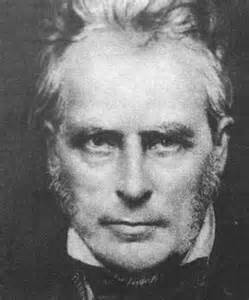
What Luther and many others ended up doing was that they clung to passages that seem to support their view and dismiss and condemn other passages that disagreed with them.
In the final analysis, a sizable part of the Reformation became a debating society, where leading Reformed scholars ended up in debating ad infinitum their favorite passages which support their views.
As eminent Protestant scholar and prolific writer Alister McGrath writes, the Reformation was much more complex and it cannot be reduced to just the motto of sola scriptura, for “a secondary hermeneutic of political character was at least on occasion instrumental in [its] propagation.”[30]
McGrath continues to say that it is “evident that the question of how the early Reformed theological communities interpreted Scripture was more problematic than is sometimes appreciated.”[31]
It is no accident that many Protestants would follow Luther’s tract in quoting passages of Scripture that support their preconceived ideas and disregard historical, contextual, and exegetical analysis. After all, as we have seen in the previous article, if “Dr. Luther would have it so,” why not thousands of other Dr. Luthers?
Why not Edward Irving, Henry Drummond, and John Nelson Darby in the nineteenth century; why not C. I. Scofield, Lewis Sperry Chafer, Charles C. Ryrie and John Walvoord in the twentieth century?[32]
Why not popularizers such as Hal Lindsey, “the self-proclaimed ‘Father of the Modern Prophecy Movement’”[33]? Why not other apocalyptic movements that came into full bloom right after the French Revolution?[34]
How does one adjudicate the theories of those men when all of them claim that they got their views from Scripture and none of them agreed with each other on some of the key points?
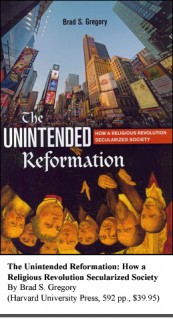 Well, it goes back to the infallible thing again. When one individual asked Darby a thought-provoking question during one of his lecture series, he responded, “I am here to supply expositions not brains.”[35]
Well, it goes back to the infallible thing again. When one individual asked Darby a thought-provoking question during one of his lecture series, he responded, “I am here to supply expositions not brains.”[35]
Darby literally excommunicated George Muller, a fine and genuine Christian gentleman and philanthropist, largely because Muller disagreed with Darby’s eschatology.[36]
It is also no accident that a sizable section of Protestant denominations became national in vision, as opposed to the Catholic Church which is international in scope.[37]
Racialist groups, in one sense, could be categorized as secularized versions or unintended consequences of the Reformation or the Protestant movement.[38]
Moreover, it is no accident that the Reformation would split into different divisions and subdivisions—Calvin disagreeing with Luther on essential theological points and vice versa, Phillip Melanchthon (Luther’s protégé and long-time friend) slowly but surely disagreeing with both Luther and Calvin on the role of freewill with respect to salvation, etc.[39] Protestant scholar and historian Gregory Graybill writes that
“Melanchthon’s evangelical free will was a response to Luther in the same manner as Arminius’ doctrine of the will was a response to Calvinism. Arminius and his popularizer John Wesley were not original—they had merely come to similar conclusions within a Reformed milieu as Melanchthon had already done within the Lutheran context.”[40]
What probably got Melanchthon thinking about Luther’s strange exegete was that Luther wanted to reject the book of James altogether from the cannon of Scripture because James, as we have already seen, did not agree with Luther’s sola fide. Melanchthon also saw a serious error in Luther’s view on the will. Nineteenth-century Protestant scholar Philip Schaff declared that
“Melanchthon, on further study and reflection, retreated in the Semi-Pelagian direction, and prepared the way for Arminianism, which arose, independently, in the heart of Calvinism at the beginning of the seventeenth century.
“He abandoned his earlier view, which he characterized as Stoic fatalism, and proposed the Synergistic scheme, which is a compromise between Augustinianism and Semi-Pelagianism, and makes the human will co-operate with preceding divine grace, but disowns human merit.”[41]
The confessions of the Lutheran faith, The formula of Concord (1577), “rejected both Calvinism and Synergism, yet taught, by a logical inconsistency, total disability and unconditional election, as well as universal vocation.”[42]
————————————————–
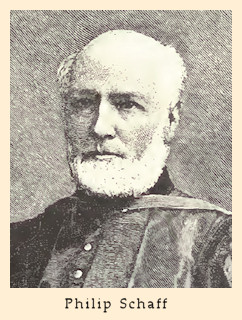 In the final analysis, Luther basically had two options: he could either reject his own theology or reject James. To reject his own theology, that means Luther would have to reject many of his central doctrines—a huge price to pay. And to accept the book of James while maintaining his own theology, Luther was cognitive enough to realize that there would be a contradiction.
In the final analysis, Luther basically had two options: he could either reject his own theology or reject James. To reject his own theology, that means Luther would have to reject many of his central doctrines—a huge price to pay. And to accept the book of James while maintaining his own theology, Luther was cognitive enough to realize that there would be a contradiction.
He solved the dichotomy by rejecting James and maintaining his own theology. Now, modern Calvinists keep telling us that “It is not philosophy that leads the Reformed believer to his or her conclusions: it is biblical exegesis that does so.”[43]
Why didn’t that work for the leading light of the Reformation? Why did he have to reject James in order to maintain his own “biblical exegesis”?
Moreover, Luther, instead of thinking these things through as a serious exegete, on many occasions resorted to smearing at individuals who did not abide by his “bondage of the will.” At the beginning of The Bondage of the Will, Luther starts bringing the whole house down by taking on Eramus’ view:
“In this book of mine, therefore, I shall harry you and all the Sophists till you tell me exactly what ‘free-will’ can and does do; and I hope so to harry you (Christ helping me) as to make you repent of ever publishing your Diatribe.”[44]
Calvin got even more extreme in his views. If there is one statement that sums up the central thrust of Calvin’s thinking, it is probably this:
“By predestination we mean the eternal decree of God, by which He determined with Himself whatever He wished to happen with regard to every man. All are not created on equal terms, but some are preordained to eternal life, others to eternal damnation; and, accordingly, as each has been created for one or other of those ends, we say that he has been predestined to life or death.”[45]
This extreme view did not die with Calvin. Schaff declared that Huldrych
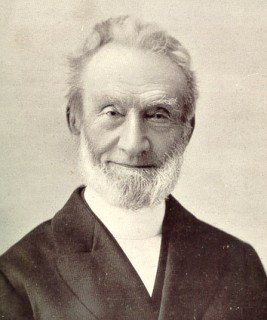
“Zwingli’s position was peculiar: on the one hand, he went so far in his supralapsarianism as to make God the sinless author of sin (as the magistrate in inflicting capital punishment, or the soldier in the battle, are innocently guilty of murder).”[46]
But when you ask Calvin specifically how a person ends up in eternal damnation, his response would be that because of the person’s sin, an inherent contradiction that even modern Calvinists cannot answer properly.
Prominent Calvinists keep saying that people end up in eternal damnation because they are rebels. One prominent Calvinist writes,
“the only difference between the vessels of wrath and the vessels of mercy is the sovereign grace of God that changes the heart of the rebel sinner and turns him from being a God-hater into a God-lover.”[47]
But those same Calvinists do not tell us that, according to Calvinism, this is the condition of everyone in the world. Moreover, they do not tell us that Calvin’s central axiom precludes the idea that people are condemned because of their sins. Weren’t they already predestined to damnation in the first place?
A corollary to Calvin’s principle here is that people are responsible and even blamed for their actions even though they cannot possibly do otherwise! Richard Dawkins gives us a somewhat secularized version of Calvin’s contradiction:
“We—and that means all living things—are survival machines programmed to propagate the digital database that did the programming.”[48]
Yet in the Selfish Gene, Dawkins writes that “We, alone on earth, can rebel against the tyranny of the selfish replicator.”[49]
We? Who’s we? Can machines choose to rebel? Where did they get that “will” or the “freedom” to do so? If the biological determinist is right, then I guess Dawkins must have some Calvinistic DNA in his system.
WAS LUTHER AN ANTI-SEMITE?
 Yet it would be irrational to claim that Luther was an anti-Semite. He certainly was acting like an irrational person, but anti-Semitism was not the gist of his argument.[50] His life as a whole rules this out; Luther had Jewish friends and he even consulted many Jews for his translation of the Bible.[51]
Yet it would be irrational to claim that Luther was an anti-Semite. He certainly was acting like an irrational person, but anti-Semitism was not the gist of his argument.[50] His life as a whole rules this out; Luther had Jewish friends and he even consulted many Jews for his translation of the Bible.[51]
In fact, it is argued that it was Anton Margaritha, a Jewish scholar who converted to Lutheranism, who made Luther aware of the Talmud’s teachings.
But why would he use such harsh language? Simple: Luther was using arguments from Old Testament law, where deviation from the law could result in a person’s death (such as Leviticus 18:20, Joshua 7, and Deuteronomy 9). In fact, Luther cited the Old Testament numerous times in his tract On the Jews and Their Lies.
(Funny thing about our age: many have declared that the Old Testament is a work of mythology but at the same time they approve Luther’s On the Jews and Their Lies, which inexorably is based on the Old Testament!)
To say that Luther was “one of history’s greatest anti-Semites,” as Gabriel Wilensky has falsely argued,[52] could hardly be based on reliable and historical scholarship.
Wilensky in particular proves that he is more interested in deliberately misquoting Luther than in historical accuracy or solid scholarship. He asserts that Luther says that
“‘the Jews deserve to be hanged on gallows, seven times higher than ordinary thieves’ and ‘We ought to take revenge on the Jews and kill them.”[53]
Without checking out the source, Wilensky’s readers would certainly get the impression that Luther was lambasting all Jews! Here is the actual quote:
“If they weren’t so stone-blind, their own vile external life would indeed convince them of the true nature of their penitence. For it abounds with witchcraft, conjuring signs, figures, and the tetragrammaton of the name, that is, with idolatry, envy, and conceit.
“Moreover, they are nothing but thieves and robbers who daily eat no morsel and wear no thread of clothing which they have not stolen and pilfered from us by means of their accursed usury.
“Thus they live from day to day, together with wife and child, by theft and robbery, as arch-thieves and robbers, in the most impenitent security. For a usurer is an arch-thief and a robber who should rightly be hanged on the gallows seven times higher than other thieves.
“Indeed, God should prophesy about such beautiful penitence and merit from heaven through his holy angel and become a flagrant, blasphemous liar for the sake of the noble blood and circumcised saints who boast of being hallowed by God’s commandments, although they trample all of them under foot and do not keep one of them.”[54]
 I am not defending Luther one bit—he should have known better. In fact, as he got older, Luther perceived that he was in error, as many of his critics have argued. Luther lamented,
I am not defending Luther one bit—he should have known better. In fact, as he got older, Luther perceived that he was in error, as many of his critics have argued. Luther lamented,
“I must suffer other thoughts from the devil. For he often casts in my teeth: ‘Oh, what a huge crowd of people you have led astray with your teaching!’”[55]
But Luther got caught applying Old Testament arguments to dealing with usurpers. Consider this in light of the story of Achan in Joshua 7, who was caught stealing and was stoned to death.
Luther was still living in the Old Testament, yet he could hardly have intended to make blanket statements about all Jews throughout space and time, otherwise he would have been condemning his Jewish friends to death.
Moreover, Luther knew very well that the New Testament he held dear was mostly written by ethnic Jews. Luther also knew that Jesus was an ethnic Jew.
A balanced analysis of the theological and historical complexity of the issue is what lacking in the work of Wilensky and others (most specifically James Carroll, whose book Constantine’s Swords is cited frequently in Wilensky’s book).
According to Wilensky, the Jews who were involved in usury in the early centuries “were forced” into it![56]
Absurdity notwithstanding, Wilensky got this idea from Joshua Trachtenberg, who served in the American rabbinate for more than two decades. In his book The Devil and the Jews, Trachtenberg wrote that
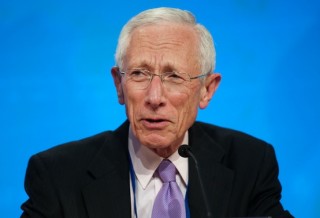
“society conspired to make [the Jew] a usurer—and usury exposed him to the cupidity of feudal overlords and to the embittered hatred of the people.”[57]
As we shall see when we examine usury, this argument is historically unacceptable and, frankly, embarrassing. Moreover, if we apply this thesis in our own time, it simply does not make any sense whatsoever.
Does America conspire to make Goldman Sachs a usurer? Does the America conspire to make the Jews behind the Federal Reserve usurers? Who conspired to make Stanley Fischer literally wreck the Russian and Argentine economy through the IMF in the 1990s?
James Carden, former advisor to the U.S.-Russia Bilateral Presidential Commission at the State Department from 2011-2012, noted that in the late 1990s
“the Russian stock market lost 75 percent of its value and inflation jumped over 80 percent. The following month saw Russia’s GDP collapse by 50 percent, while capital investment and meat and livestock herds fell by around 75 percent. By the time the decade was out some estimates had anywhere between 50 and 75 percent of Russians living below—or barely above—the poverty line.
“The recovery was long in coming. In 2003—fully five years after Fischer’s speech—Russia’s GDP remained almost 30 percent below what it was in 1990 while capital investment remained a mere 10 percent of what it was then. Neither the IMF’s performance—nor Fischer’s confidence in happy outcomes—were altered by the events in Russia…
“Not long after, the Argentine government, acting on Fischer’s advice, imposed austerity measures with unsurprising results. By the time 2001 came to a close, the official unemployment soared to around 20 percent; protests rocked the country which forced President Fernando de la Rua out; and the government defaulted on $155 billion in foreign debt, which remains, to this day, the largest debt default in history. Argentina’s poverty rate increased by about 50 percent, while its GNP fell by 11 percent by the end of 2001.”[58]
If Fischer’s tract record is that bad, should we as thinking citizens applaud the Obama administration when they put him in charge of the Federal Reserve? If Fischer fooled people more than once, would that make any sense to allow him to fool us a third time? What kind of common sense does that make?
At this present moment in America, where “Nearly 50,000 Iraq and Afghanistan veterans were either homeless or in a federal program aimed at keeping them off the streets during 2013, almost triple the number in 2011, according to numbers released Thursday by the Department of Veterans Affairs,”[59] do we really need a Stanley Fischer as head of the Federal Reserve?
At this present time, major colleges and universities throughout the U.S. are beginning get rid of core subjects such as history, political science, physics[60] and a large section of the humanities departments largely because the economy and education are in a dismal shape.[61]
In response to the proposed cuts to the humanities departments at state universities, North Carolina’s governor Patrick McCrory declared,

“It’s not based on butts in seats but on how many of those butts can get jobs.”[62] McCrory probably looked at some statistics, where “43 percent of new Ph.D.’s had no job or postoc offer by graduation in 2011…”[63]
If Fischer’s tract record does not look good, what would he add to this economy? Fischer is a former governor of the Bank of Israel and has dual citizenship in Israel and the U.S. It is certain that he will give allegiance to Israel first, a country that even Robert Gates (a pro-Israel himself) recently says has led the United States to dangerous zones in the Middle East.[64]
As Carden moves on to say,
“Is there any reason to believe Fischer is the right person to help steer the Fed in light of the ongoing jobs crisis here in the United States?
“If you consider the following, the U.S. economy still has quite a long way to go. There are, as of this writing, three unemployed people for every available job; the long-term unemployed (those who have been out of work for 27 weeks or more) account for well over a third of all unemployed; the labor force participation rate—at around 63 percent—is the lowest it has been since 1978. To make matters worse, on December 28th 1.3 million people lost their unemployment benefits.
“In the final analysis, the trouble with the Fischer appointment stems not so much from the issue of his dual citizenship, which is an objection others have made, but from his long track record of implementing neoliberal economic ‘reforms’ without paying due attention to their consequences for people of ordinary means. At base, the problem with the Fischer/IMF approach to political economy is that, as with ideologies generally, they are teleological in nature.”[65]
 In any event, if Wilensky and Trachtenberg are looking for a source of Jewish usury, they should look carefully in the Talmud, which says that “Jews may use lies to circumvent a Gentile” Baba Kamma 11a. There is more:
In any event, if Wilensky and Trachtenberg are looking for a source of Jewish usury, they should look carefully in the Talmud, which says that “Jews may use lies to circumvent a Gentile” Baba Kamma 11a. There is more:
“If a gentile hits a Jew, the gentile must be killed. (BT Sanhedring 58a).
“The deeds of Israel are righteous, but the gentiles are capable only of
sin. (BT Baba Bathra 10b).
“For executing a gentile, only one person’s testimony is necessary (to kill
“A Jew, two witnesses are necessary) (BT Sanhedrin 57b).
“If a gentile kills a Jew, the gentile is to be killed. But if a Jew kills a
gentile, the Jew is to go free. (BT Sanhedrin 57a).
“Eve had sexual intercourse with the serpent, transmitting lust to the
gentiles, from which Israelites are exempt. (BT Abodah Zarah 22a).
“Christians are allied with hell, and Christianity is worse than incest. (BT
Avodah Zarah 17a).
“When Messiah comes, he will destroy the Christians. (BT Sanhedrin 99a).”[66]
Finally, if Wilensky and others want to try to understand why people are upset about Jewish behavior, they need to look at the Israeli-run project called the NSA. At this present time, the vast majority of Americans oppose the program.[67] And much of the people in the world feel the same way.[68] But one Pentagon official seems to be upset and declares,
“I would love to put a bullet in [Snowden’s] head. In a world where I would not be restricted from killing an American, I personally would go and kill him myself.”[69]
I hope Wilensky and others are not stupid enough to say that the American people and much of the world are anti-Semites because they resist the NSA’s covert activity. And I hope Wilensky and others are smarter than AEI hawks such as Gary Schmitt, who said that the NSA does not really infringe on people’s privacy.[70]
[1] Will Durant, The Story of Civilization: The Reformation (New York: Simon & Schuster, 1957), 372.
[2] See Frank Bailey, Blind Allegiance to Sarah Palin (New York: Howard Press, 2011), chapter 8.
[3] Erich Johnson, Bachmann Seeks Miracles in Presidential Race,” Yahoo News, January 2, 2012; for a similar story, see for example Daniel Burke, “Bachmann’s Prophecy, Joke or Not, Has Lots of Company,” The Christian Century, August 29, 2011.
[4]Quoted in Eric Black, “Who Does Michelle Bachmann Think She Is?,” Minnesota Post, September 12, 2011.
[5] Michelle Bachmann, Core of Conviction: My Story (New York: Penguin Group, 2011), extracted from chapters 1 and 3.
[6] Ibid.
[7] Martin Luther, Luther’s Works, (Philadelphia: Fortress Press, 1962), 200-201.
[8] See for example Jerome Murphy-O’Connor, Paul: His Story (Oxford: Oxford University Press, 2005).
[9] This is confirmed by Protestant and Catholic scholars and even by some of the most radical Jewish scholars. No serious secular historians who studied the events in Palestine in the first and second centuries disprove the claim. See for example Daniel Boyarin, A Radical Jew: Paul and the Politics of Identity (Berkley: University of California Press, 1994); Wayne A. Meeks, The First Urban Christians: The Social World of the Apostle Paul (New Haven: Yale University Press, 2003); Jerome Murphy-O’Connor, Paul: A Critical Life (Oxford: Oxford University Press, 1996); James T. Tabor, Paul and Jesus: How the Apostle Transformed Christianity (New York: Simon & Schuster, 2012); Mark Allan Powell, Introducing the New Testament: A Historical, Literary, and Theological Survey (Grand Rapids: Baker Academic, 2009); Moyer V. Hubbard, Christianity and the Greco-Roman World (Grand Rapids: Baker Academic, 2010); Michael F. Bird, Introducing Paul: The Man, His Mission and His Message (Downers Grove: IVP Academic, 2008).
[10] Jerome Murphy-O’Connor, Paul: His Story (Oxford: Oxford University Press, 2005), 2.
[11] Shlomo Sand, The Invention of the Jewish People (New York: Verso, 2009), 289.
[12] Graetz, History of the Jews vo.l 5 (Philadelphia: Jewish Publications Society of America, 1893),187.
[13] Ibid., 5:187-188.
[14] Graetz, History of the Jews, Vol. 4 (Philadelphia: Jewish Publications Society of America, 1893),423.
[15] Solomon Grayzel, A History of the Jews: From the Babylonian Exile to the Establishment of Israel (Philadelphia: Jewish Publications Society of America, 1947), 165.
[16] Ibid., 171.
[17] Daniel J. Flynn, Intellectual Morons: How Ideology Makes Smart People Fall for Stupid Ideas (New York: Crown Forum, 2004), 1.
[18] Augustine, City of God (New York: Penguin, 2003), 48.
[19] Donald M. Lewis, The Origins of Christian Zionism (Cambridge: Cambridge University Press, 2010), 103.
[20] Henry Kamen, The Spanish Inquisition: A Historical Revision (New Haven: Yale University Press, 1998).
[21] See for example Will Durant, The Story of Civilization: Age of Faith (New York: Simon & Schuster, 1950), 388-389; Israel Jacob Yuval, Two Nations in Your Womb: Perceptions of Jews and Christians in Late Antiquity and the Middle Ages (Berkley: The University of California Press, 2006), 282; David G. Dalin., The Myth of Hitler’s Pope: Pope Pius XII and His Secret War Against Nazi Germany (WA: Regnery Publishing, 2005).
[22] Quoted in Durant, The Age of Faith, 389.
[23] Israel Abrahams, Jewish Life in the Middle Ages (Philadelphia: Jewish Publication Society, 1993), 400.
[24] Ibid., 400-401; Abrahams, were he alive today, would have repudiated Daniel Jonah Goldhagen’s thesis in The Devil That Never Dies out of hand.
[25] Ibid., 402.
[26] Quoted in Jones, The Jewish Revolutionary Spirit, 149.
[27] Louis Israel Newman, Jewish Influence on Christian Reform Movements (New York: Columbia University Press, 1925).
[28] Martin Luther, On the Jews and Their Lies (East Sussex: The Historical Review Press, 2011), 109.
[29] Manuel Velasquez, Philosophy: A Text with Readings (Boston: Wadsworth Group, 2002), 51.
[30] Alister McGrath, The Intellectual Origins of the European Reformation (Malden: Blackwell, 2004), 158.
[31] Ibid.
[32] For a historical survey, see for example Paul Boyer, When Time Shall Be No More: Prophecy Belief in Modern American Culture (Cambridge: Harvard University Press, 1992).
[33] Victoria Clark, Allies for Armageddon: The Rise of Christian Zionism (New Haven: Yale University Press, 2007), 146; for further studies, see Timothy P. Weber, Living in the Shadow of the Second Coming: American Premillenialism, 1875-1925 (Oxford: Oxford University Press, 1979).
[34] For further studies, see Thomas Robbins and Susan J. Palmer, ed., Millennium, Messiahs, and Mayhem: Contemporary Apocalyptic Movements (New York: Routledge, 1997).
[35] W. G. Turner, John Nelson Darby (London: C. A. Hammond, 1944), 21.
[36] See for example William E. Cox, An Examination of Dispensationalism,” http://www.gospeltruth.net/dispcox.htm.
[37] E. Michael Jones does a great job explaining this. He writes, “White culture was essentially secularized Protestantism…And because [Catholicism] was international, it was not ‘white’ in the way that the Protestant sects were. The Protestant churches, by the facts associated with their inception, had become de facto national churches. The Church of England was a national and therefore ‘white’ church in the way that the Catholic Church in Spain was not and could never become…Beginning with Luther, who established a rigorously German national church in the sixteenth century, Protestantism could only propose a particularly ethnocentric brand of Christianity which lacked the cultural flexibility to absorb members of other races…Christianity had become ‘white’ through its association with Protestant national churches. At the same time it had become ‘white,’ it had become secularized as well, leaving it prey to pseudo-scientific racialist ideologies. Christian doctrine was succumbing to ideologies like Darwinism and the related beliefs of racial superiority that would flourish in the late nineteenth and early twentieth century. In each instance, one had not only a ‘white’ religion, i.e., one associated with an ideology of race, one had likewise a hypocritical ‘white’ religion, which had proven incapable of maintaining doctrinal orthodoxy in both faith and morals.” E. Michael Jones, Libido Dominandi: Sexual Liberation and Political Control (South Bend: Augustine’s Press, 2000), 347-348, 349.
[38] For a rigorous study on a similar issue, see for example Brad S. Gregory, The Unintended Reformation: How a Religious Revolution Secularized Society (Cambridge: Harvard University Press, 2012).
[39] See for example Gregory Graybill, Evangelical Free Will: Phillipp Melanchthon’s Doctrinal Journey on the Origins of Faith (Oxford: Oxford University Press, 2010).
[40] Ibid., 316.
[41] Philip Schaff, History of the Christian Church, vol. 8 (Grand Rapids: Eerdmans Publishing, 1985), 547.
[42] Ibid.
[43] James R. White, The Potter’s Freedom (Amityville, NY: Calvary Press, 2009), 38; and Calvinism is not a philosophical system? Some Calvinists even assert that the average person does not get it because it is too complex, but it is not philosophy!
[44] Martin Luther, Bondage of the Will (Grand Rapids: Baker Academic, 1957), 80.
[45] John Calvin, Institutes of the Christian Religion (Peabody, MA: Hendrickson Publishers, 2008), 610.
[46] Schaff, History of the Christian Church, vol. 8, 547.
[47] White, The Potter’s Freedom, 214.
[48] Richard Dawkins, River Out of Eden: A Darwinian View of Life (New York: Basic Books, 1995), 19.
[49] Richard Dawkins, The Selfish Gene (New York: Oxford University Press, 1989), 201.
[50] Martin E. Marty, Martin Luther: A Life (New York: Penguin, 2008), 169.
[51] See Heiko A. Oberman and Eileen Walliser-Schwarzbart, Luther: Man Between God and the Devil (New Haven: Yale University Press, 2006), 208; Louis I. Newman, Jewish Influence on the Christian Reform Movement (New York: Columbia University Press, 1925).
[52] Gabriel Wilensky, Six Million Crucifixions (San Diego, CA: QWERTY Publishers, 2919), 51.
[53] Ibid., 52.
[54] The book has been abridged over the years, but some editions remain intact; see Martin
Luther, On the Jews and Their Lies, translated by Martin H. Bertram.
[55] Quoted in David C. Steinmetz, Luther in Context (Grand Rapids: Baker Academic, 2002), 1-2.
[56] Wilensky, Six Million Crucifixions, 67.
[57] Joshua Tractenberg, The Devil and the Jews: The Medieval Conception of the Jew and Its Relation to Modern Anti-Semitism (Philadelphia: Jewish Publication Society, 1943), 189.
[58] James Carden, “How the Fed’s Would-Be No. 2 Helped Wreck Russia: Stanley Fischer’s Record of Reckless Neoliberal Reforms Should Sink His Appointment,” American Conservative, January 9, 2014.
[59] Gregg Zoroya, “Up to 48,000 Afghan, Iraq Vets at Risk for Homelessness,” USA Today, January 17, 2014.
[60] Timothy Pratt, “‘We Are Creating Walmarts of Higher Education,’” Atlantic, December 26, 2013.
[61] Heidi Tworek, “The Real Reason the Humanities Are ‘in Crisis,’” Atlantic, December 18, 2013.
[62] Ibid.
[63] Jordan Weissmann, “Why Haven’t Humanities Ph.D. Programs Collapsed?,” Atlantic, September 16, 2013.
[64] Robert Gates, Duty: Memoirs of a Secretary at War (New York: Alfred A. Knopf, 2014), 172-173, 185-186, 388-389.
[65] Carden, “How the Fed’s Would-Be No. 2 Helped Wreck Russia: Stanley Fischer’s Record of Reckless Neoliberal Reforms Should Sink His Appointment,” American Conservative, January 9, 2014
[66] Michael Hoffman, Judaism Discovered (Coeur D’Alene: Independent History and Research, 2008), 345-386.
[67] Susan Page, “Poll: Most Americans Now Oppose the NSA Program,” USA Today, January 20, 2014.
[68] Jeminas Kiss, “Privacy Tools Used by 28% of the Online World, Research Finds,” Guardian, January 21, 2014.
[69] http://news.yahoo.com/fugitive-us-leaker-snowden-39-fears-life-39-160419186.html; http://www.thewire.com/politics/2014/01/tough-nsa-guys-have-tough-words-dweeb-snowden-usa-usa-usa/357143/; http://www.dailymail.co.uk/news/article-2543375/I-love-bullet-head-NSA-whistleblower-Edward-Snowden-fears-life-receiving-anonymous-death-threats-Pentagon-NSA.html.
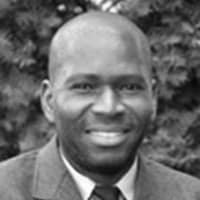
Jonas E. Alexis has degrees in mathematics and philosophy. He studied education at the graduate level. His main interests include U.S. foreign policy, the history of the Israel/Palestine conflict, and the history of ideas. He is the author of the new book Zionism vs. the West: How Talmudic Ideology is Undermining Western Culture. He teaches mathematics in South Korea.
ATTENTION READERS
We See The World From All Sides and Want YOU To Be Fully InformedIn fact, intentional disinformation is a disgraceful scourge in media today. So to assuage any possible errant incorrect information posted herein, we strongly encourage you to seek corroboration from other non-VT sources before forming an educated opinion.
About VT - Policies & Disclosures - Comment Policy



